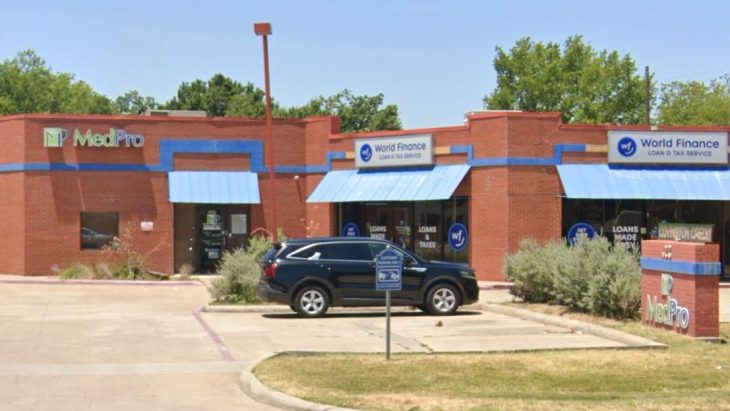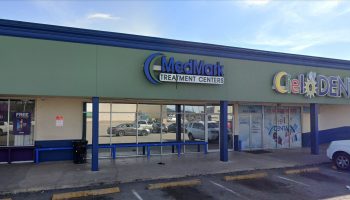MedPro Treatment Centers

About MedPro Treatment Centers
MedPro Treatment Centers is located in McKinney, Texas. They offer outpatient detoxification, medication assisted treatment (MAT) and regular outpatient treatment services for clients with substance use disorder (SUD) and co occurring mental health issues.
They accept many types of insurance, including different Medicare and Medicaid plans. For uninsured clients, they offer a sliding fee scale. Clients are allowed to smoke in designated areas of the facility.
A Positive and Nonjudgmental Addiction Treatment Experience
This treatment center has been praised for its nonjudgmental and supportive staff members. Clients have also noted that the staff is positive and professional. The center is near the historic downtown area that features boutiques, art galleries, and antique stores.
McKinney has lots of small neighborhood parks and larger amenity filled community parks. The staff welcomes all clients and has experience treating those in the LGBTQIA+ community. They work with pregnant and postpartum women and identify methadone as the treatment of choice for pregnant women with opioid addiction.
Veterans and active military personnel and their families can receive care, as well as with abuse, sexual abuse, and trauma survivors, and individuals with HIV/AIDS. MedPro Treatment Centers is also able to help clients referred from the court system.
Dual Diagnosis Treatment Track in McKinney
Many clients with addictions have an underlying mental health issue. The counselors will help you identify and address these issues to provide more effective treatment.
The treatment approaches include cognitive behavioral therapy (CBT), rational emotive behavioral therapy (REBT), motivational interviewing (MI) and other supportive therapies. They also offer relapse prevention support and brief interventions as necessary.
Supportive Services for Continued Sobriety
It’s important to your sobriety to have stable housing and employment. The program gives housing assistance and helps with job training and counseling services.
You’ll have a case manager to help you access all services available to you. You’ll also engage in social skills training, which helps with employment and everyday activities.
| Levels of Care | Detox Service Setting | Programs | Payment Options | |||
|---|---|---|---|---|---|---|
|
In outpatient therapy, you’ll attend therapy sessions several times each week while living at home. This is ideal if you have a strong support system and a lower risk of relapse. Outpatient treatment offers flexibility to maintain work, school or family obligations. |
||||||
|
Outpatient detox gives you access to medically supervised withdrawal services while still allowing you to live at home. You’ll attend a clinic for treatment and monitoring. This flexible option is suitable for those with mild to moderate withdrawal symptoms who have strong support systems. |
||||||
|
Adult programs address the substance use and life challenges specific to adults. Therapists can deliver sessions in individual, group and family settings. Services often include job support and life skills training in a structured environment. |
Alcohol detox programs offer medical support to help individuals withdraw safely from alcohol. Your care team may use medications to ease your symptoms and provide medical monitoring to address complications. |
Drug detox programs support individuals who are withdrawing from addictive substances like cocaine and heroin. Medical support helps you manage symptoms in a controlled and safe environment so you can achieve initial sobriety. |
Men's programs address substance use while also considering the social pressures, family roles and mental health concerns that are specific to men. You’ll learn healthy coping mechanisms as you build emotional resilience and develop communication skills. |
Opioid detox uses medications to ease severe withdrawal symptoms. It also includes medical supervision to help you manage potential complications. These services allow you to stabilize and begin a recovery plan. |
Women's programs offer a safe and supportive space to focus on gender specific issues such as trauma, family roles and mental health conditions. Therapists tailor the sessions to address women's needs and foster empowerment in a healing and nurturing environment. |
Young adult programs are designed for individuals who are transitioning into adulthood. Topics of discussion typically include identity, independence and peer relationships. Providers may also offer life skills training and career support. |
|
Payment Assistance
|
Self Pay
|
Levels of Care
In outpatient therapy, you’ll attend therapy sessions several times each week while living at home. This is ideal if you have a strong support system and a lower risk of relapse. Outpatient treatment offers flexibility to maintain work, school or family obligations.
Detox Service Setting
Outpatient detox gives you access to medically supervised withdrawal services while still allowing you to live at home. You’ll attend a clinic for treatment and monitoring. This flexible option is suitable for those with mild to moderate withdrawal symptoms who have strong support systems.
Programs
Adult programs address the substance use and life challenges specific to adults. Therapists can deliver sessions in individual, group and family settings. Services often include job support and life skills training in a structured environment.
Alcohol detox programs offer medical support to help individuals withdraw safely from alcohol. Your care team may use medications to ease your symptoms and provide medical monitoring to address complications.
Drug detox programs support individuals who are withdrawing from addictive substances like cocaine and heroin. Medical support helps you manage symptoms in a controlled and safe environment so you can achieve initial sobriety.
Men's programs address substance use while also considering the social pressures, family roles and mental health concerns that are specific to men. You’ll learn healthy coping mechanisms as you build emotional resilience and develop communication skills.
Opioid detox uses medications to ease severe withdrawal symptoms. It also includes medical supervision to help you manage potential complications. These services allow you to stabilize and begin a recovery plan.
Women's programs offer a safe and supportive space to focus on gender specific issues such as trauma, family roles and mental health conditions. Therapists tailor the sessions to address women's needs and foster empowerment in a healing and nurturing environment.
Young adult programs are designed for individuals who are transitioning into adulthood. Topics of discussion typically include identity, independence and peer relationships. Providers may also offer life skills training and career support.




